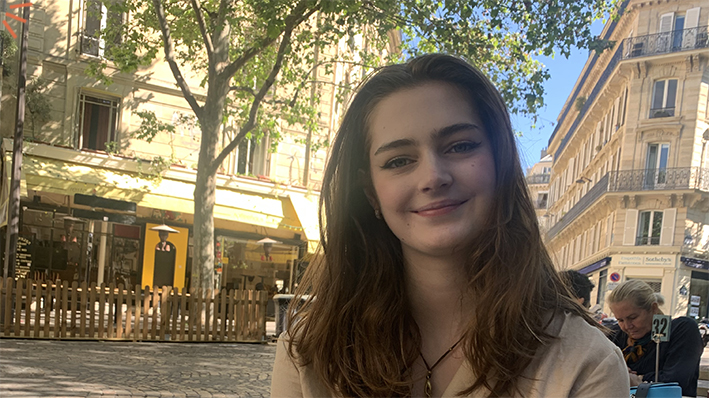
courtesy of Caroline Levin
Georgina Masson is from Cambridge, U.K. She has been studying at Sciences Po in Reims and is continuing her studies at University of California, Berkeley.
How would you define the purpose of marriage?
To the highest extent, a celebration of love and a signaling to others the pretense of committing yourself to someone emotionally for a significant period of time both before and after the actual ceremony.
As of right now, do you envision yourself getting married in the future? Is it a decision that’s definite (be it a political statement or a definite plan OR to just be played by ear)?
I envisage getting married at some time in my life. When, where, who and how are still very much dependent. I want to play some things by ear, others depend on time and relevance.
COMMON VALUES
Marriage means different things to different people. My decision to be married also relies on another person who shares my values and wishes. I may still dedicate myself a relationship even though I don’t feel the need to be married. This isn’t a deal breaker for me, and it doesn’t inspire fear.
If you have pre-determined ideas of exactly when, how, and where you want to get married, then you set yourself up for disappointment. Human emotion doesn’t have a deadline or a hand-in date: in the same way you can’t arbitrarily say you want to be married by a certain date in a certain way.
If you do choose to ever get married, why would that be?
I don’t think I will be married my whole life to the same person: I think it’s an unreasonable expectation of anybody. If I ever get married, it would be because I share values with a person that I want to secure in my life: I want to secure that presence in my life.
comfortable committing
I would choose to be married with a person on the basis that I feel comfortable committing myself for the foreseeable future.
Do you think your decision to get married or not would ultimately be tied to your parents’ expectations? Elaborate
My immediate reaction is no, whatever they thought, I would make my own decision. But I can’t deny the implicit approval of family nonetheless is difficult to avoid.
IT ALL DEPENDS
It really depends on whom I bring back, and what they say about that person. It would be difficult for me to completely block their opinions from my mind.
Do you think we enter marriage all too absentmindedly (without questioning the purpose beyond the glamorized image)?
Marriage can mean different things for different people, and this is ok. For some people, marriage doesn’t have to be an important step, whether they choose to get married or not.
DIFFICULT TO JUDGE
Once we start judging people for their reasons (or lack thereof) for entering marriage, however, it becomes very difficult to judge which might diminish the value of the practice, institution and ritual in non-normative senses (marriage as an institution to demonstrate relationship status as opposed to traditional values, etc.)
Do you believe marriage solidifies or weakens a relationship?
Very much depends on the people joining in the relationship and their beliefs about relationships. Are they religious and believe in marrying for life? Do they assign spirituality to the status of marriage?
no easy answer
There is no easy way to work out whether a marriage is entirely strengthening or weakening. There are areas that strengthen (finances maybe), and some that weaken (willingness to work on problems). Difficult question with no easy answer.
What do you think is more of a political statement (politics meaning this decision reflects an attempt to try and jab at the system at hand we abide by without questioning): to not get married or to not have kids?
To not have kids is a far more political statement. There are some very positive representations of people who have not been married, in popular culture and media. There are fewer positive representations of people who choose not to have children.
PROCREATION
In a way, being married and not having kids can be more offensive to some people. They relate the institution of marriage to the Christian ideal that it is used to procreate.
When you’re married and choose not to have children, you’re inversing the traditional norm of a nuclear family, whereas when you simply choose to not be married, there are fewer questions of why.
I feel my pov is very biased. I present myself as someone who doesn’t want kids, and so has already dealt with people’s reactions. Whereas I haven’t said I don’t want to marry, so I haven’t felt people’s reactions to that.
In your eyes, pros, and cons of marriage?
Pros of marriage – commitment of love, enjoyment of another, demonstration to your partner and society of your emotional commitment to a person, facility of labels in society so people can better understand you and communicate with you.
a life-long commitment
Cons of marriage – expectation of life-long commitment by others, difficulty of separating the institution from traditional norms, perpetuation of CIS gendered, heterosexual, monogamous norms that disadvantage minorities in different ways. Co-dependency.
About the Article
A British university student studying abroad in France and soon in California reflects on the significance of marriage today.



